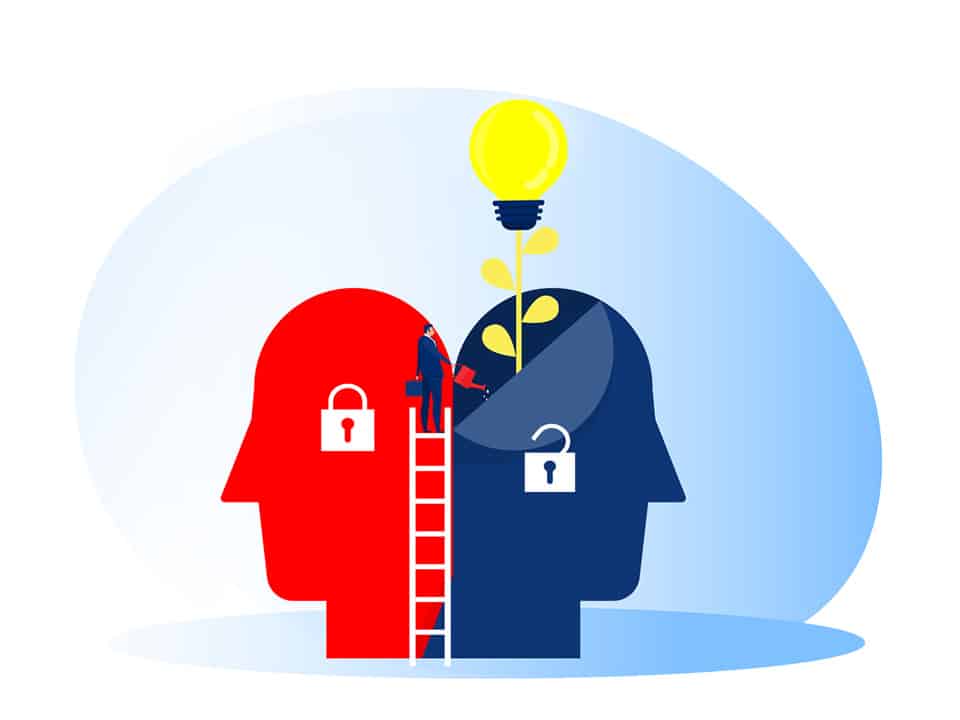Cognitive behavioral therapy (CBT) for substance use disorders and mental health care. Tailored CBT to each patient’s needs. Qualified, experienced clinicians.


Cognitive-behavioral therapy (CBT) is a kind of talk therapy. Its underlying premise contends that we have mental disorders and psychological distress because we hold onto harmful and negative thoughts. These kinds of thoughts include negative general beliefs, or schemas, about the world, the self, and the future.
This happens because these negative beliefs help form specific and automatic thoughts in particular situations. e.g., that the world is a harmful place, the self is ill-equipped, and the future holds failure and personal demise – in turn reinforcing mental disorders and distress, including alcohol and substance use disorders.
Underlying Premise of Cognitive-Behavioral Therapy

Negative thinking patterns represent and reinforce cognitive distortions. These kinds of cognitive distortions underlie many disorders including substance use disorders and related anxiety disorders, etc. Psychopathology results from faulty information processing that leads to distorted and dysfunctional thinking; this type of thinking leads directly to negative emotional experiences and maladaptive behaviors.
Thus, faulty information processing is the underlying culprit that is wreaking havoc in a lot of people’s lives. So, let’s address that root cause and adjust the information processing. Once we achieve this, the dysfunctional and distorted thinking levels out, emotional experiences become more pleasant and positive, and behaviors become more personally and socially appropriate.

The idea of CBT treatment is that therapeutic approaches to change these underlying negative thoughts and thought patterns help the individual feel better and help them engage in more positive behavior patterns. Therefore, CBT techniques include helping the patient identify, evaluate, and ultimately modify cognitive distortions to create thinking patterns that are more realistic and adaptive.
Some common cognitive distortions that we see regularly in our cognitive behavioral therapy sessions:

Oftentimes, it is these types of negative and maladaptive thinking patterns that build the poor mental health foundation for the addiction the patient is here to treat. So, once we can adjust the thinking, the mental health improves, and in turn, so do the substance use disorders, anxiety disorders, eating disorders, and whatever else is plaguing the patient and causing them to turn to substances to help cope instead of actively problem-solving.
Consistent with the psychiatry medical model, CBT’s overall treatment goals are symptom reduction, functional improvement, and disorder remission. In order to achieve these goals, the patient becomes an active participant in problem-solving:

They test and challenge the validity of maladaptive cognitions and alter maladaptive behavioral patterns. The combination of cognitive, emotional, and behavioral-focused techniques helps address these areas in the active disorder.
Our cognitive-behavioral therapists work to replace all of these negative thinking patterns with healthy adaptive thoughts and productive coping skills for optimal mental health. In this form of therapy, these mental health professionals work with the patients to address each thought pattern individually.
What appears to be a short-term treatment can yield long-lasting therapeutic results. Long-term success rates often rely on patients’ willingness to continue following therapeutic guidelines over time and to reach out for therapy help when needed, which does not always happen in our self-help-driven society.

Meta-analyses published by the National Institute of Health (NIH) observe that long-term success rates of psychoanalysis and other forms of psychotherapy and mental healthcare interventions rely on continued patient participation. That is, if the patient reverts to prior patterns of distorted thinking, that patient can anticipate the return of cognitive disorders including substance use disorders as well.

In employing the cognitive-behavior therapy technique, the CBT therapist will first work through a thinking pattern with a patient in session. Then, the therapist will ask the patient to test out the validity of existing assumptions and predictions in the real world.
For example, a woman may believe that her boss thinks she’s a “failure”.
The therapist recognizes this as a likely cognitive distortion, perhaps an overgeneralization from an error the woman made in her work a time or two. Thus, the therapist may ask the patient to request a direct evaluation of her job performance from her boss. Then she compares that assessment with what she predicted her boss would say.

Correcting patients’ cognitive distortions leads to improved mood and behavior. The patient will have less anxiety knowing the truth about her boss’s thoughts, and she will perform better at work and be more social around coworkers owing to her reassured confidence.
As this example illustrates, the woman was suffering from inaccurate beliefs about another’s perception of her. This inaccurate belief caused the woman to feel inadequate, in turn bringing her a lot of work-related anxiety when she needed to perform, and encouraging her to socially withdraw due to feelings of inferiority. And yet, the woman’s beliefs were inaccurate. These are the kinds of cognitive distortions that, first of all, wreak havoc in our lives, including making us crazy and driving us to use and abuse substances, and secondly, that we address in cognitive-behavioral therapy sessions.

Our clinicians at Premiere Recovery Center are experienced in applying the full spectrum of CBT options based on an individual’s specific needs. Cognitive-behavioral therapy is an important element of our treatment programs, and we employ it in various capacities as appropriate to the individual. We use it in group therapy and individual therapy, its specific application based on idiosyncratic patient needs.
Cognitive-behavioral therapy entered the psychological association menu of treatment options beginning with Aaron Beck’s work in 1976. Its usefulness in a variety of contexts quickly gained traction and spurred the discovery of specific interventions for specific conditions.
Today, CBT protocols have been developed to address a variety of mental and emotional conditions, and CBT is more of an umbrella category of treatment types rather than a singular approach. There are several forms of CBT and types of therapy that are considered CBT. Despite differences in specific CBT protocols, all rest on the assumption that maladaptive cognitions (thinking patterns) are the cause of emotional distress and consequent poor behavior. Therefore, modifying cognitions decreases emotional distress and ensuing maladaptive behavior. Treatment protocols have been tailored to address specific types of disorders including general anxiety disorder, panic disorder, social anxiety disorder, post-traumatic stress disorder, obsessive-compulsive disorder, and health anxiety.
The specific CBT approach employed depends on the disorder targeted. For example, using CBT for panic disorder assumes that these patients misinterpret physical symptoms associated with anxiety as harmful. However, social anxiety is about self-focused thoughts and scrutiny coupled with fear of embarrassment and humiliation. Yet, general anxiety disorder and obsessive-compulsive disorder have in common excessive obsessions or worries about future undesirable events. The skilled counselor knows these differences and how to apply the appropriate forms of CBT to address the patient’s precise mental health condition.



Owing to its efficaciousness and relative ease of use, CBT has gained tremendous popularity in addressing a wide variety of mental and physical healthcare conditions. Consistently, meta-analyses show that CBT is helpful for helping heal many ailments of the mind and body, including substance use disorders and other forms of mental unwellness. Shifts to healthier thinking help cultivate shifts to healthier behavior.

Use of CBT to address substance use disorders has shown efficacy as both a singular therapy and as part of a combination of treatment strategies.
Plenty of research has found cognitive behavioral therapy for alcoholism and cognitive behavioral therapy for drug abuse quite effective.

Our clinicians at Premiere Recovery Center are experienced in applying the full spectrum of CBT options based on an individual’s specific needs. Cognitive-behavioral therapy is an important element of our treatment programs, and we employ it in various capacities as appropriate to the individual. We use it in group therapy and individual therapy, its specific application based on idiosyncratic patient needs.

Premiere Recovery Center has made a name for itself in the greater Portland Metropolitan area for high-quality, caring, compassionate, and confidential treatment for substance use and mental wellness. We rely on CBT as a base for a lot of our therapeutic modalities, and also employ other therapies as appropriate to the individual’s situation. Each individual is evaluated separately and a treatment plan is customized for each patient’s needs.

Premiere Recovery Center is located in Happy Valley, Clackamas County, Oregon. We are off of 82nd Avenue near Clackamas Town Center. This location affords our patients a quiet, private, comfortable, and upscale ambience to do important healing work. We are beyond the fray of Portland, yet accessible from anywhere in the region.
We proudly serve our neighbors in Clackamas, Washington, and Multnomah Counties, as well as the greater Portland-Vancouver area and indeed the entire region. We don’t care where you’re from.
We just want to help.


Our patients often benefit from staying in clean-and-sober housing during treatment. We are an intensive outpatient facility serving ambulatory patients at Levels 2.1 and 2.5 levels of care (non-residential, intensive therapy), not an inpatient, residential facility, although we can certainly provide a referral if you need one.
We also offer homes for our patients to live in during treatment if they like. These are upscale, spacious, comfortable, luxury homes in Pleasant Valley (women) and Happy Valley (men), with all amenities conceivable.

Post-treatment, a lot of people benefit from living in a transitional housing facility for a time. We are affiliated with Premiere Sober Living, a transitional housing complex. Many of our current and former patients live at Premiere Sober Living.


Whatever your needs for substance use and mental health care, we can help.
Give us a call today.
We will assess your situation and make sure you get to the right place for the right care at this time.
© 2011-2025 Premiere Recovery Center. All Rights Reserved.
Privacy Policy • Terms of Service • Disclaimer